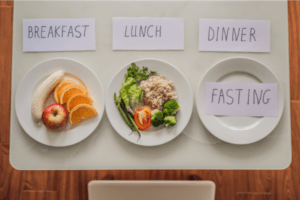How to do Intermittent Fasting
Intermittent fasting is an excellent method for losing weight, increasing energy, and being healthy. However, if you don’t know how to do it correctly, it might be difficult to begin intermittent fasting. Intermittent fasting is a safe, long-term approach to reducing weight and enhancing your health. You can stick to your plan and receive the rewards with adequate planning and assistance.
This simple guide will teach you how to get started with intermittent fasting, covering what to eat and what to avoid, as well as how to keep to your schedule.
What is intermittent fasting?
Intermittent fasting is an eating pattern in which you alternate between eating and not eating or fasting. It’s an excellent strategy to shed pounds (1), enhance insulin sensitivity (2), and improve your general health (3).
Fasting may be done in a variety of ways, but all include refraining from eating for a specified amount of time each day or week. Some individuals fast for 12 to 16 hours every day, while others fast for 24 hours once or twice a week. The key to intermittent fasting success is to discover a way that works for you and adhere to it.
The 16:8 technique is the most often used. Fasting for 16 hours and eating for 8 hours is required. You may do this by missing breakfast and eating just lunch and supper. It does not imply eating nonstop for eight hours! Alternatively, you may stop eating at 8 p.m. and resume eating at 12 p.m. the following day. If such hours are inconvenient for you, just change them by an hour or two. For example, stop eating at 7 p.m. and resume at 11 a.m. the next day.
Fasting every day may not be tempting, so you may want to get into it gradually. There are several approaches to this. To begin, you may just refuse to eat after your evening meal. Once you’ve established this habit, you may either have breakfast later or your evening meal sooner. This may not work if you wake up early for work and eat before leaving the home. Another option is to fast just on days when it is more convenient. You might also try the 5:2 diet, which is another popular intermittent fasting approach.
This entails eating regularly five days a week and cutting your calories to 500 calories on two days. Those two days must not be consecutive. One day during the week and one on the weekend is ideal. On Sunday and Wednesday, for example.

Why should you start intermittent fasting?
Weight reduction, increased insulin sensitivity, and lower inflammation are just a few of the health advantages of intermittent fasting.
Intermittent fasting may assist you in losing weight by lowering your total calorie intake. Fasting forces your body to utilize stored energy (fat) as fuel. This may result in weight loss, particularly if you do not adjust by eating more during your eating windows.
Intermittent fasting may also aid in the improvement of insulin sensitivity. Insulin is a hormone that aids in the digestion of sugar. When insulin levels are elevated, the body accumulates extra fat. When insulin levels are low, however, your body uses stored fat for energy. So, by lowering insulin levels via intermittent fasting, you may assist your body in burning more fat (4).
Intermittent fasting may help lower inflammation as well. Many disorders, including heart disease, cancer, and Alzheimer’s disease, are associated with inflammation. Fasting may help decrease inflammation by lowering inflammatory monocyte production. Monocytes are tiny proteins that aid in the immune response. As a result, by lowering inflammation, intermittent fasting may help protect against illnesses such as heart disease, cancer, and Alzheimer’s (4).
What to eat while intermittent fasting
 You can eat anything you want during your eating windows while you’re fasting. You are not limited in what you can consume. However, it is preferable to stick to entire, healthful meals. Fruits and vegetables, lean meats, entire grains, and healthy fats are all included. This will assist in reducing cravings and preventing overeating. When fasting, it is also a good idea to consume enough of fresh water.
You can eat anything you want during your eating windows while you’re fasting. You are not limited in what you can consume. However, it is preferable to stick to entire, healthful meals. Fruits and vegetables, lean meats, entire grains, and healthy fats are all included. This will assist in reducing cravings and preventing overeating. When fasting, it is also a good idea to consume enough of fresh water.
When you eat for a shorter period of time than normal, you will naturally consume less. Ideally, you should consume no more calories than normal. Fasting will have no effect if you consume more calories than you burn.
What not to eat while fasting
Sugary beverages, processed meals, and harmful fats should be avoided while fasting. These may both induce and inhibit weight reduction. Sodas, juices, and sports drinks are examples of sugary beverages. Packaged snacks, baked products, and fast meals are examples of processed foods. Fried meals, processed meats, and full-fat dairy all contain unhealthy fats.
What to eat or drink during fasting hours.
It might be difficult to know what you can and cannot eat or drink during fasting hours. The quick answer is that you should refrain from eating anything. While it may seem difficult, keep in mind that the bulk of those hours will be spent sleeping. Hopefully for around eight hours.
Certain beverages may be consumed throughout the day. Some individuals, for example, just drink water, while others may allow themselves coffee or tea. Coffee and tea, on the other hand, should be served black and without sugar. You may also consume herbal or fruit teas. Why not switch things up a little so you don’t get bored?
Finally, clear broth may be consumed. Simply boil some bones, drain, and consume the broth. You may use leftover roast chicken bones or purchase beef bones from a butcher.
How to stick to your intermittent fasting plan
Making sure you’re prepared is the easiest way to stick to your fasting schedule. This includes having healthy food alternatives on hand and planning ahead of time what you’ll eat. Informing your friends and family about your intermittent fasting strategy might also be beneficial. This can help them understand why you aren’t eating at certain times of the day and will urge them to support your efforts. Finally, don’t be too harsh on yourself if you make a mistake. Don’t give up if you have a terrible day or break your plan. Simply restart the next day.
You now understand what intermittent fasting comprises and how to get started. As with everything worthwhile, patience is required; effects from intermittent fasting may not be quick. However, if you continue with it, you will reap several health advantages in the long term.
References
- Intermittent Fasting: Is the Wait Worth the Weight? https://www.ncbi.nlm.nih.gov/pmc/articles/PMC5959807/
- Intermittent fasting: is there a role in the treatment of diabetes? A review of the literature and guide for primary care physicians https://www.ncbi.nlm.nih.gov/pmc/articles/PMC7856758/
- Health effects of intermittent fasting: hormesis or harm? A systematic review https://academic.oup.com/ajcn/article/102/2/464/4564588?
- Mount Sinai Researchers Discover That Fasting Reduces Inflammation and Improves Chronic Inflammatory Diseases https://www.mountsinai.org/about/newsroom/2019/mount-sinai-researchers-discover-that-fasting-reduces-inflammation-and-improves-chronic-inflammatory-diseases
The post How To Do Intermittent Fasting appeared first on https://gqcentral.co.uk
Comments are closed